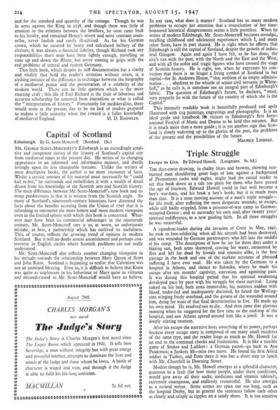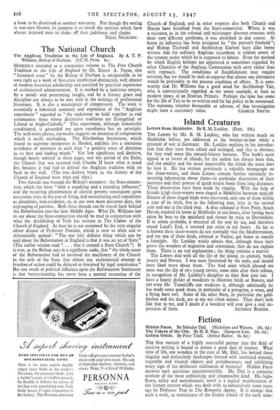Triple Struggle
Escape to Live. By Edward Howell. (Longmans. 8s. 6d.)
THE dust-cover drawing, in chalky blues and browns, showing sun- burned men shouldering great bags of loot against a background of Promethean rocks and eagles, might lead the casual reader to set this book down as a tale too plain for those who have passed the age of fourteen. Edward Howell could in fact well become a boy's war-hero, and his book a boy's book; but it is much more than that. It is a most moving account of a man's triple struggle— for life itself, after suffering the most desperate wounds; to escape, while still badly crippled, from a prisoner-of-war camp in German- occupied Greece; and to surrender his own soul, after twenty years' spiritual indifference, to a new guiding faith. In all three struggles he was successful.
A squadron-leader during the invasion of Crete in May, 1941, he took to foot-soldiering when all his aircraft had been destroyed, and was wounded by German paratroopers who fell into the middle of his camp. The description of how he lay for three days under a blazing sun, both arms shattered, craving for water, tormented by flies and left for dead by friends and enemies alike, is the best passage in the book and one of the starkest accounts of physical suffering I have ever read. He Was taken by the Germans to a hospital in Athens, and thence to Salonika, where he made his escape after ten months' captivity, starvation and agonising pain. It was during this hospital period that his spiritual awakening developed pace by pace with his struggle for sheer survival. Lying naked on his bed, both arms immovable, his mattress sodden with blood, under-fed and inadequately doctored, he heard the Welling- tons winging freely overhead, and the groans of the wounded around him, dying for want of that final determination to live. He made up his own mind. He resolved not to die. And then came that glorious morning when he staggered for the first time to the roof-top of the hospital, and saw Athens spread around him like a jewel. It was a deeply stirring moment.
After his escape the narrative loses something of its power, perhaps because every escape story is composed of too many small incidents of the same type, and the reader longs as much as Mr. Howell for an end to the continual checks and frustrations. It is like a terrible game of Snakes and Ladders : a German patrol—go back to Ayo Prodomos; a Junkers 88—miss two turns. He found his first Allied soldier in Turkey, and from there it was but a short step to lunch with Mr. Churchill in Downing Street.
Modest though he is, Mr. Howell emerges as a splendid character, generous to a fault (for how many people, under these conditions, would give away all their socks, medicines and vitamin tablets?), extremely courageous, and endlessly resourceful. He also emerges as a natural writer. Some scenes are spun out too long, such as the hospital Derby, but in general the sentences follow each other as clearly and crisply as ripples on a sandy shore. It is too sensitive a book to be dismissed as another war-story. For though the setting is war-torn Greece, its purpose is to reveal the motives which have always inspired men to shake off their indolence and chains.
NIGEL NICOLSON.



































 Previous page
Previous page